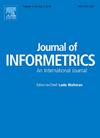Impact of gender composition of academic teams on disruptive output
Abstract
Intergender collaboration is becoming increasingly common in academia. However, the impact of team gender structures on innovation remains unknown. Using data from the American Physical Society, this study applies the disruption index to measure the relationship between gender composition and innovation performance. The results show that compared with single-gender teams, moderate inter-gender collaboration has a greater potential to produce disruptive knowledge and must be adopted by scientific teams. Specifically, the types of innovation in mixed-gender teams are affected by the gender composition. If the proportion of female scholars and their participation increase in a mixed-gender team, it can positively contribute to disruptive performance. If female scientists are placed on a male-dominated team, they may function as consolidation representatives. The robustness results indicate that the conclusions also apply to male scientists. The results suggest that males and females have no significant physiological differences in innovation and that the key is to find a gender balance in collaboration. Based on the theories of similarity-attraction and cognitive diversity, the reasons for the differences between female and male scientists may be team atmosphere and their roles in collaboration. This study can serve as a reference for policymakers and funders when building teams to achieve disruptive discoveries.

 求助内容:
求助内容: 应助结果提醒方式:
应助结果提醒方式:


